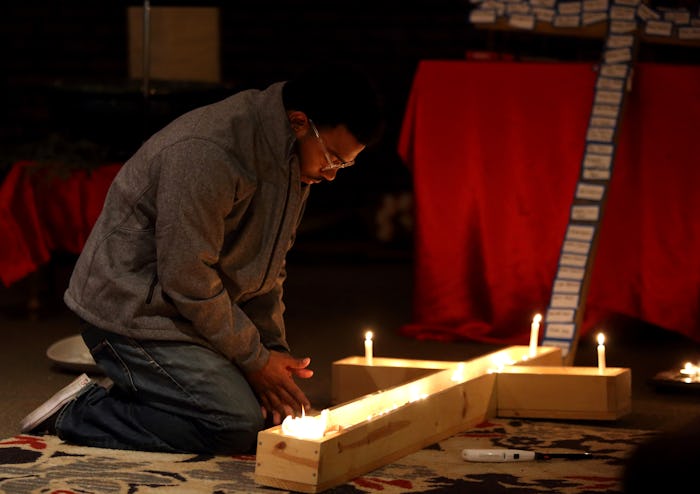News

ISIS: Smoke & Mirrors
In a terrifying series of events on Monday, 18-year-old Abdul Razak Ali Artan drove his car into a group of people on the Ohio State campus, then exited the vehicle and began slashing at bystanders with a knife. Eleven people were injured and hospitalized, and Artan himself was later fatally shot by Ohio State Police Officer Alan Horujko, after reportedly refusing orders to stop and drop his weapon. In the aftermath, horrified faculty and students — many of whom had witnessed the incident or barricaded themselves inside classrooms to keep themselves safe — recalled the moment in haunting detail. Artan's family and friends too seemed shocked that the young man they had known as a "good kid" had been capable of carrying out such a vicious attack. Within 48 hours of the initial incident, ISIS had claimed responsibility for Artan's actions, boasting that Artan had been a "soldier" in its war. But despite the Islamic State's desperate attempt to take credit for yet another bloody attack, perhaps the most important detail for the public to remember is that, as with most things IS does, the claim was all for show.
"We all know when things like this happen that there's a tendency sometimes for people to put people together and create other kinds of theories," Ohio State President Dr. Michael V. Drake said in a news conference Monday. "We don't know anything that would link this to any community. We certainly don't have any evidence that would say that's the case. What we want to do is really unify together and support each other; do our best to support those who were injured in their recovery, and then allow the investigation to take place."
A law enforcement official who spoke to the Associated Press this week said that Somalia-born Artan had been "the child of a refugee" and that he had been "living in Pakistan from 2007 to 2014."
"Upon arriving in the U.S., Artan was referred for a secondary Customs and Border Protection inspection, but nothing abnormal was found," the AP quoted the official as saying, adding that "a secondary inspection is often routine and based on someone's travel history and length of stay in certain countries."
Artan's own words betrayed the Islamic State's claim as well: According to authorities, in a Facebook post just before the attack, Artan had pleaded with the United States to "stop interfering with other countries, especially the Muslim Ummah (Muslim people at large)."
"By Allah, we will not let you sleep unless you give peace to the Muslims," he reportedly wrote. "You will not celebrate or enjoy any holiday." In an earlier post, Artan reportedly said that he had reached a "boiling point" over human rights abuses in Myanmar (which include alleged abuses against Muslims and other stateless or marginalized groups), according to CNN, adding that he "[couldn't] take it anymore."
Some could argue, of course, that these were the words of a young man who had become radicalized. But as many analysts pointed out in the hours after the attack, the more detailed hallmarks of an ISIS-pledged attack were not present in this one. More specifically, there was no visible oath of allegiance in any of Artan's final posts, something that most radicalized ISIS-bound militants often leave up as a final testament. Certainly, Artan's actions — using a car as a weapon to "mow down" victims, as Islamic State leaders have previously encouraged — signal one thing. But the finer points of the attack betray his own allegiance as belonging to nothing but his own emotions.
The Islamic State's own playbook is another dead giveaway. As The New York Times pointed out in a 2014 interactive column titled "How ISIS Works," the militant group's foot soldiers are often pre-occupied with big-game ground campaigns across Iraq and Syria — initially taking stronghold cities like Mosul, Homs, and the beleaguered Aleppo, and dealing with any official military forces that stood in their way. With little manpower in the West, ISIS specifically relies on lone-wolf attacks, many of them pledges by outliers looking to gain standing with the militant group. (Think of it as an initiation rite.)
But ISIS itself is losing power. The uptick in lone-wolf attacks claimed by the Islamic State alone are proof that the militant group is losing the ability it once had to take on the big dogs and win. Compared to the gains it was previously making, it's all but finished in terms of traditional warfare. With its ground forces being forced out of former strongholds and into the open, the only thing left for ISIS leaders to do is to claim responsibility for scattered lone-wolf attacks across the West, as a way to try and prove its strength — but make no mistake: ISIS isn't expanding in the way some in politics have attempted to pass off. Its harebrained, half-hearted attempts at taking ownership over isolated incidents are simply a smokescreen intended to portray a false image of what's really going on behind the scenes. These are the death throes of a once-menacing global threat that has suddenly and depressingly found itself losing ground and shoved to one small corner of the international conversation, as its contemporaries — such as Jabhat Fateh Al-Sham (formerly the al-Nusra front) — swoop in to try and install and market themselves wherever they can.
It's certainly possible that 18-year-old Artan was acting out in allegiance to the Islamic State when he drove that car into pedestrians on Monday morning. Authorities have not said yet whether the incident was truly terror-related or simply a violent outburst by an unhinged teen. But if history and intelligence have taught us anything, it's that ISIS' claim over this alleged "lone-wolf" attack is likely nothing more than a veiled attempt to gain relevance one more.